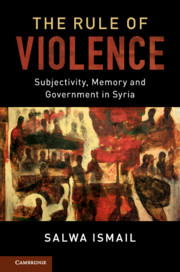Crossref Citations
This Book has been
cited by the following publications. This list is generated based on data provided by Crossref.
2019.
Promoting Democracy, Reinforcing Authoritarianism.
p.
257.
Conduit, Dara
2019.
The Muslim Brotherhood in Syria.
France, Pierre
2019.
Deux guerres lasses.
Revue internationale de politique comparée,
Vol. Vol. 25,
Issue. 1,
p.
147.
Abboud, Samer
2020.
Reconciling fighters, settling civilians: the making of post-conflict citizenship in Syria.
Citizenship Studies,
Vol. 24,
Issue. 6,
p.
751.
Shaery-Yazdi, Roschanack
2020.
Acting historians: Historicism, memory, and performance among Lebanese former detainees from Syria.
History and Anthropology,
Vol. 31,
Issue. 2,
p.
197.
Schulhofer-Wohl, Jonah
2020.
On-Side fighting in civil war: The logic of mortal alignment in Syria.
Rationality and Society,
Vol. 32,
Issue. 4,
p.
402.
Cuyler, Zachary Davis
2020.
Toward the Target and the Goal: Infrastructure Sabotage and Palestinian Liberation in the Pages of al-Hadaf.
Historical Materialism,
Vol. 28,
Issue. 4,
p.
67.
González Zarandona, José Antonio
and
Munawar, Nour A.
2020.
The unfallen statues of Hafez Al-Assad in Syria.
City,
Vol. 24,
Issue. 3-4,
p.
642.
2020.
Winning Lebanon.
p.
216.
Bou Nassif, Hicham
2020.
Endgames.
Gissi, Angela
2020.
Places of Memory and Legacies in an Age of Insecurities and Globalization.
p.
307.
Wagemakers, Joas
2020.
The Muslim Brotherhood in Jordan.
Meininghaus, Esther
and
Schlüsing, Carina
2020.
War in Syria: the translocal dimension of fighter mobilization.
Small Wars & Insurgencies,
Vol. 31,
Issue. 3,
p.
475.
Willis, Emma
2021.
Metatheatrical Dramaturgies of Violence.
p.
137.
Willis, Emma
2021.
Metatheatrical Dramaturgies of Violence.
p.
197.
Al Azmeh, Zeina
Dillabough, Joanne
Fimyar, Olena
McLaughlin, Colleen
Abdullateef, Shaher
Aloklah, Wissam Aldien
Mamo, Adnan Rashid
Abdulhafiz, Abdul Hafiz
Al Abdullah, Samir
Al Husien, Yasser
Al Mohamad Al Ibrahim, Ammar
Al Ibrahim, Ziad
Barmu, Taiseer
Farzat, Abdulnasser
and
Kadan, Bakry
2021.
Cultural trauma and the politics of access to higher education in Syria.
Discourse: Studies in the Cultural Politics of Education,
Vol. 42,
Issue. 4,
p.
528.
Willis, Emma
2021.
Metatheatrical Dramaturgies of Violence.
p.
1.
Willis, Emma
2021.
Metatheatrical Dramaturgies of Violence.
p.
45.
Romero-Amaya, Daniela
2021.
Historical Justice and History Education.
p.
107.
Gani, Jasmine K
2021.
Racial militarism and civilizational anxiety at the imperial encounter: From metropole to the postcolonial state.
Security Dialogue,
Vol. 52,
Issue. 6,
p.
546.





